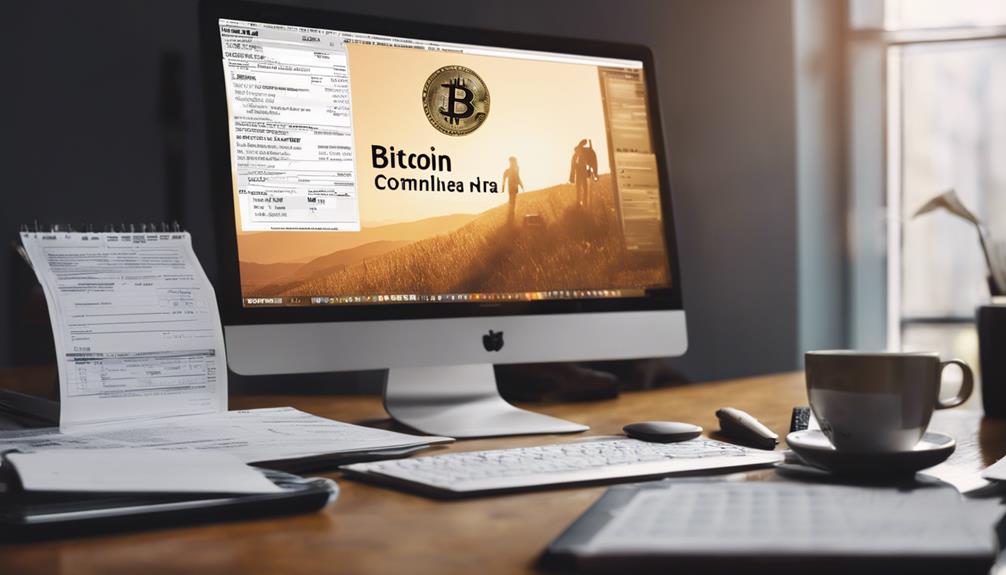Many misconceptions about Bitcoin IRAs can lead you to costly mistakes. While they are fully legal, some believe they’re shady or unregulated, which isn’t true—regulations exist and reputable providers ensure compliance. Others think taxes always apply or that security is weak; in reality, crypto IRAs can offer tax advantages and security protocols. Understanding the real rules around rollovers and reporting can save you from future penalties. Keep exploring to uncover the facts behind these common myths.
Key Takeaways
- Bitcoin IRAs are fully legal and regulated, not scams or loopholes, ensuring compliance with IRS guidelines.
- Proper management and reputable custodians mitigate the high volatility risks of cryptocurrencies in IRAs.
- Tax advantages like tax-deferred growth or tax-free withdrawals in Roth IRAs are often underestimated.
- Misconceptions about unreported gains and security threats can lead to costly penalties and losses.
- Understanding IRS reporting and rollover rules is essential to avoid penalties and maximize investment benefits.

Are Bitcoin IRAs truly as risky or confusing as many believe? The truth is, they are entirely legal under IRS regulations. Since 2014, cryptocurrency has been classified as personal property, making it eligible for inclusion in IRAs. IRS Notice 2014-21 explicitly recognizes digital currencies as assets that can be held within retirement accounts. This means that using a crypto IRA isn’t some loophole or shady scheme; it’s a legitimate investment vehicle backed by clear regulations. As long as you work with reputable IRA providers, you can be confident that your crypto investments remain compliant with IRS guidelines. There are no federal laws prohibiting digital currencies inside retirement accounts, so concerns about legality are largely unfounded.
Many people also worry about the tax implications when investing in a Bitcoin IRA. In reality, assets held inside these accounts grow either tax-deferred or tax-free if you opt for a Roth IRA. This setup allows your crypto assets to appreciate without the annual capital gains taxes that typically apply outside of IRAs. If you’re a long-term holder, often called a “HODLer,” you’ll see significant benefits from sheltering your crypto gains from taxes until you withdraw. Plus, when you decide to sell or switch your crypto holdings within an IRA, many platforms allow you to do so without incurring extra fees or liquidity costs. This flexibility means you can manage your portfolio efficiently, shifting between assets as market conditions change, all while maintaining the tax advantages of your IRA.
Crypto assets in IRAs grow tax-deferred or tax-free, offering long-term savings and flexible portfolio management.
Some think investing in crypto within an IRA is complicated or risky. While cryptocurrencies are inherently volatile, that doesn’t mean your IRA is riskier than traditional investments. Proper management, including selecting reputable custodians and diversifying your holdings, can mitigate risks. The misconception that crypto IRAs are scams or unregulated is false; many platforms operate under strict oversight, and IRS reporting requirements ensure transparency. Additionally, understanding the regulatory environment surrounding crypto IRAs can help you feel more confident in your investments. Also, contrary to the myth that crypto investments inside IRAs are hidden or anonymous, IRS regulations mandate extensive reporting of all transactions, making tax evasion difficult. You will only face taxes on distributions, not on trades or account growth, which simplifies compliance. Furthermore, the security protocols employed by trusted providers help protect your assets from theft or hacking, giving investors additional peace of mind.
Finally, some believe they can roll over their IRA into a crypto IRA anytime or that IRS reporting is optional. In truth, there are prescribed timelines for rollovers, and all transactions are reportable. Custodians handle most reporting duties, reducing your burden. The idea that small gains go unnoticed by regulators is a myth; increased enforcement and lowered reporting thresholds mean the IRS closely monitors crypto activity within IRAs. Understanding these facts can help you avoid costly mistakes and make informed decisions about your crypto retirement investments.
Frequently Asked Questions
Can I Convert My Traditional IRA to a Bitcoin IRA Tax-Free?
You can convert your traditional IRA to a Bitcoin IRA, but it’s not tax-free. The conversion itself is generally tax-deferred, meaning you won’t pay taxes immediately, but you’ll owe taxes when you withdraw funds. If you choose a Roth Bitcoin IRA, you’ll pay taxes upfront on the converted amount, but future withdrawals could be tax-free. Always consider your tax situation and consult a financial advisor before converting.
Are There Any Hidden Fees Associated With Bitcoin IRAS?
You’re wondering if any hidden fees come with Bitcoin IRAs. While many providers disclose their costs upfront, some may have hidden charges like setup, deposit, or transaction fees that aren’t obvious at first glance. Always read the fine print and ask directly about all possible fees before investing. Being aware of these costs helps you avoid surprises that could eat into your investment returns over time.
How Secure Is My Bitcoin IRA Against Hacking?
Your Bitcoin IRA’s security depends on the platform’s protections. While many use multi-factor authentication and cold storage to safeguard assets, no system is completely hack-proof. Hackers use sophisticated tactics like social engineering and exploiting vulnerabilities. To minimize risks, choose providers with strong security measures, regular audits, and insurance options. Stay vigilant, update your security settings often, and understand that some residual risk always remains in digital asset management.
Is Bitcoin IRA Investing Suitable for All Age Groups?
You wonder if Bitcoin IRA investing suits all age groups. While there’s no age limit for opening a Bitcoin IRA, your suitability depends on your risk tolerance, investment goals, and understanding of cryptocurrency volatility. Younger investors might benefit from its growth potential, but older investors should consider their risk comfort and retirement timeline. Always evaluate your financial situation and consult a professional to determine if this strategy aligns with your age and retirement plans.
What Are the Penalties for Early Withdrawal From a Bitcoin IRA?
If you withdraw funds from your Bitcoin IRA before age 59.5, you face a 10% early withdrawal penalty plus income taxes on the amount. Certain exceptions, like buying a first home or paying for education, can exempt you from this penalty. Remember, early withdrawals can also complicate your tax filings, so consider long-term investment strategies to avoid unnecessary penalties and taxes.
Conclusion
Don’t let myths blind you or hold you back from smart investing. While misconceptions might seem like obstacles, uncovering the truth can open doors to new opportunities. Think of the risks as lessons, not barriers. With knowledge, you can navigate the world of Bitcoin IRAs confidently. Embrace the facts, dispel the myths, and take control of your financial future. Because in the end, understanding outweighs confusion, and action beats hesitation.









